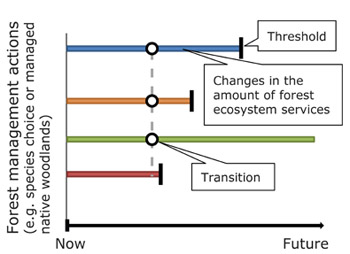Summary
Summary
To sustain benefits – known as ecosystem services – from forests under climate change and to apply relevant adaptation actions, forest managers and policymakers need to know about the impacts affecting their provision. In addition, they need to assess the sustainability of forest management actions into the future, while considering changes in demands for forest ecosystem services.
This project aims to tackle these concerns by developing and applying the new method for climate change adaptation – Future Forest Management Pathways (FFMP) (previously known as Action Expiration Chart). The Figure shows the main components of the FFMP with forest management actions evaluated by a pool of delivered forest ecosystem services and understanding the limits as associated thresholds.

Research objectives
The FFMP can help to answer, but is not limited to, the following questions:
- How may future climate change and socio-economic pressures impact forest ecosystem services provision in my location?
- When we can expect this change to happen?
- What forest management actions might reach their ecological or economical thresholds/limits?
- Which forest management adaptation action we can still apply to provide long-term forest benefits?
Results so far
The FFMP has already been tested with the Scottish forestry and with the New Forest Inclosures in England. We are starting to implement FFMP in protecting oak ecosystem (PuRpOsE) project, in which we will use FFMP to integrate information from surveys, modelling, and stakeholder workshops. Also, we are promoting FFMP in the public forestry, trying to help foresters make better and informed decisions.
The main benefits of FFMP are, among others, a synthesis of the expected climate change impacts on forest ecosystem services, while incorporating the pre-defined limits to a sustainable delivery of forest management actions, and a selection of robust management options.
Status
This project started in 2014. The developed future forest management pathways approach is currently used for climate change adaptation activities within the Forestry Commission but also with other projects, e.g. the PuRpOsE project.
Related Products/Services
Research papers (open access):
Petr, M., Boerboom, L.G.J., Ray, D., van der Veen, A., 2015. Adapting Scotland’s forests to climate change using an action expiration chart. Environ. Res. Lett. 10, 105005.
Petr, M., Boerboom, L.G.J., Ray, D., van der Veen, A., 2016. New climate change information modifies frames and decisions of decision makers: an exploratory study in forest planning. Reg. Environ. Chang. 16, 1161–1170.
Articles:
Petr, M. and Ray, D. 2017 Evaluating Options for Robust Forest Adaptation to Climate Change – introduction of the adaptation expiration chart method. Quarterly Journal of Forestry, Vol 111, No. 3, pp.183 -187.
Contact
Funders and partners
The Forestry Commission funds this research as part of Climate Change Adaptation programme
Forestry Commission policy
This research supports climate change adaptation policy of the Forestry Commission /climatechange and UKFS guidelines.
